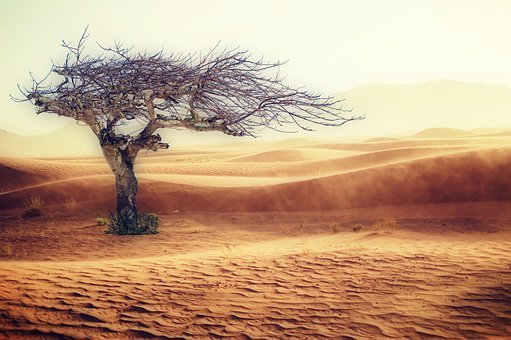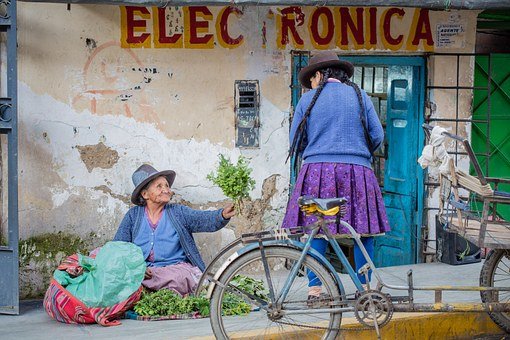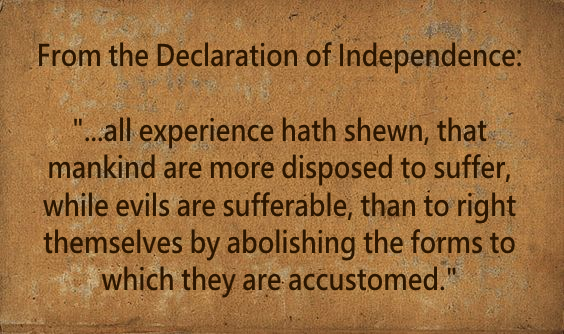Tragedy brings out the best in us: TSU Biweekly Question
Stories of earth’s collapse surround us. Hollywood increasingly brings apocalyptic visions to life and we see wastelands with turf wars waged as resource scarcity takes center stage. We often wonder, what would happen if an “end of times” narrative played out? In each generation the mythos continues that the ever-looming threat of apocalypse may happen in this lifetime or the next. It is a part of our collective consciousness and we wonder if people in cities would turn to rampant pillaging, the darkest parts of humanity rising to the surface in a free for all scavenging.

image source
Yet actual experiences of communities under drastic threat reveal that a different characteristic emerges in real-life catastrophes.
This week, @tribesteemup asks us,
“If you could teach/show everyone in the world one thing, (something that has a huge impact on humanity) what would it be?”
Currently I am reading a book by George Marshall called Don’t Even Think about it: Why Our Brains Are Wired To Ignore Climate Change. In it, he digs into extensive research he has done in an attempt to unravel & speak to the reasons humans have trouble taking climate change seriously. It’s a very interesting book and I’m reading it to help myself understand the evolutionary & survivalist psychological underpinnings of why we as a species find this hard to face.
Interestingly enough, he finds that people who have experienced extraordinary events of climate change like hurricanes, droughts, severe flooding or wildfires are less likely to “believe” in climate change. Oftentimes, in the wake of such disasters climate change isn’t even mentioned as people sort through the wreckage. Speaking to the town that endured a ferocious wildfire (30 mph winds empowered a fire that burned 54 sq miles of forest, destroyed 1,600 houses, and could be seen from outer space) in the town of Bastrop, Texas in October 2011, he writes,
“What was curious, though, was that, when I visited Bastrop a year later not one person, in a string of formal interviews, could recall for me a single conversation in which they had discussed climate change as a potential cause of the drought or fire.”
The same thing also happened in the Oceanside town of Sea Bright, New Jersey after Hurricane Sandy (damaged 350,000 homes and waylaid the town). It turns out that people most affected by climate change events usually don’t have mental space to attribute it as such. Instead, they’re working on banding together as communities.
Marshall writes about those who endured the fires in Bastrop,
“Above all though, what they wanted to share with me was their pride in their community and their capacity to overcome challenges. They spoke of the many acts of kindness, altruism, and generosity from strangers.” The same happened in the town of Sea Bright,
“The strong sense of local pride I found in Bastrop and Sea Bright is entirely consistent with that found in other areas after disasters. Contrary to expectations, people rarely respond to natural disasters with panic, and there is often a marked fall in crime and other forms of antisocial behavior. People consistently tend to pull together, displaying unusual generosity and a sense of purpose.”
If I could teach the world one thing it would be this aptitude toward kindness.
I was very fortunate in that I grew up in a household full of kindness and experienced much kindness from community and strangers alike as I grew up. This has continued into my adulthood and I make it a part of my ripple to extend kindness into my circles.

image source
Others aren’t so fortunate and have either never experienced kindness or have had a bad experience which closes them off to the potential to receive anything but pain from the outside world. I know some of these people myself, always having a tale of woe to share about how they have been wronged.
It is encouraging and heartening to hear that the apocalyptic narrative of cars on fire and houses looted isn’t indeed what actually pans out in times of severe communal struggle. Perhaps in the larger cities this would be different, but I believe that one of the strongest ways we can influence humanity in an impactful way is to keep the flame of kindness alive. It isn’t partisan and reaches beyond our differences to find the spot of shared humanity. In times of struggle, these communities have found this spot and acted from it.
In the worst and best of times, it is what sustains us. It is a free action that also feeds the one who gives it. This is my hope and prayer for humanity. Let’s change the narrative and keep kindness alive.
In the end, only kindness matters.
Posted from my blog with SteemPress : http://www.ozarkmountainjewel.com/2019/04/27/tragedy-brings-out-the-best-in-us-tsu-biweekly-question/
This reminds me of an article I read about New Orleans right after Katrina. It described an eye-witness account of how certain gangster-look-alikes drove around in their gold-rimmed SUV supplying drinking water to the residents who were in need of it. Meanwhile the authorities, whose job it should have been to do the same, were to busy trying to stop them.
I agree, deep down us humans are quite good at organizing ourselves into functioning communities. It's just a misinformation, spread by those few who are not, that the rest of us aren't either. So as horrible as a disaster may be, it's precisely this misinformation that will crumble first as a result of it.
Thank you so much for participating in the Partiko Delegation Plan Round 1! We really appreciate your support! As part of the delegation benefits, we just gave you a 3.00% upvote! Together, let’s change the world!
To listen to the audio version of this article click on the play image.

Brought to you by @tts. If you find it useful please consider upvoting this reply.
Sometimes it seems that our backs have to be up against the wall before we remember that community is linked to survival and kindness is linked to community.

Just wish we weren't so long suffering.
With all the tragedy in the world, it is the stories of kindnesses given in those times that last a lifetime and make all the difference in the world to each person experiencing the tragedy and it ripples out, almost like a human version of the starfish story. Love this @mountainjewel <3
Having lived through a hurricane I would mirror your opinion. As devestating as it was, the open, kind and caring attitude which was pervasive both at our home and in the community we fled to is what I remember most. You just can't place a price on the value of kindness, both given and received. Love your writing @mountainjewel : oxoxox and you!
Yes!!!! When I watch people being vicious and cruel in films about the apocalypse, it's an immensely enjoyable fiction (what would I do in that situation? Why did they behave like that?) ... BUT the stories that come out of these disasters is people being KIND and helping each other. Humanity ain't as fucked as they say. Love always.
Posted using Partiko Android
Hi @mountainjewel!
Your post was upvoted by @steem-ua, new Steem dApp, using UserAuthority for algorithmic post curation!
Your UA account score is currently 4.865 which ranks you at #1345 across all Steem accounts.
Your rank has improved 45 places in the last three days (old rank 1390).
In our last Algorithmic Curation Round, consisting of 190 contributions, your post is ranked at #29.
Evaluation of your UA score:
Feel free to join our @steem-ua Discord server
Thank you for reminding us of that! It is so easy to get caught up with the kind of fear mongering depicted in apocalypse situations.
To be reminded of our humanity and to let kindness come forward is a great lesson indeed!